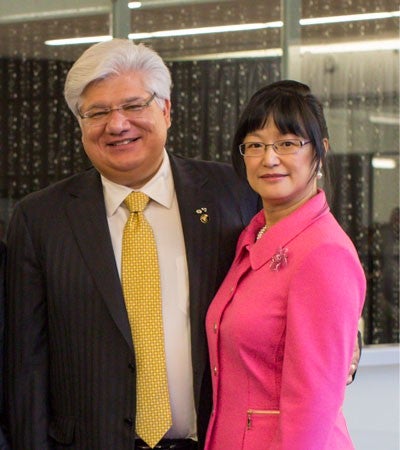
Opinion: Canada's stake in the quantum race
We are on the cusp of a completely new technological era: the quantum age. The race for the economic benefits of quantum technologies is Canada’s to lose

We are on the cusp of a completely new technological era: the quantum age. The race for the economic benefits of quantum technologies is Canada’s to lose
By Raymond LaFlamme Faculty of Science
Raymond LaFlamme, O.C.
Professor, Faculty of Science
> Institue for Quantum Computing
> Mike and Ophelia Lazaridis "John von Neumann" Chair in Quantum Information
> Canada Research Chair in Quantum Information
The quantum race will not be won by the first to develop a quantum computer.
It will be won by those who see the breadth of the quantum opportunity. Just as we saw classical computing evolve from large, room-sized machines to ubiquitous small devices, some carried in our pockets, we will witness a similar transformation in the quantum age. Only this time, instead of the United States dominating the sector, Canadian companies are poised to take the lead.
Built with the purpose of attracting the best quantum physicists, engineers and mathematicians from around the world, IQC is now home to more than 200 researchers, postdoctoral fellows and students working in a world-class facility that is the model for those nations now looking to invest in quantum research. Waterloo, Ontario and Canada invested early in people, highly specialized labs, and education programs to ensure we have the best shot to compete.
Because 15 years before the United States, China and the United Kingdom started dedicating significant resources to collaborative quantum research, the University of Waterloo’s Institute for Quantum Computing (IQC) was already conducting cross-disciplinary research and creating an ecosystem ready to support early-stage, high-risk/high-reward opportunities in quantum technologies.
Today, quantum computing has moved from theoretical endeavours to experimental explorations that further discovery and understanding – sparking a nascent quantum industry. As we get closer and closer to the realization of a practical quantum computer, we also learn more and more about the quantum world and the incredible opportunities it presents.
I am frequently asked, “When will we have a quantum computer?” But that question is missing the broader opportunity of quantum technologies: sensors, detectors, unbreakable cryptographic protocols and other devices that will allow us to understand and harness our environment like never before.
New quantum resistant cryptographic protocols have already been produced and quantum sensors, some available today, offer such extreme precision they are useful in areas like geological exploration such as well logging, or for medical applications such as identifying and understanding biological processes in our bodies. Imagine if we could detect rogue cells on the verge of turning cancerous or better understand how proteins misfold and lead to diseases like Alzheimer’s or Parkinson’s. These and other major research challenges might not be insurmountable in a world with quantum technologies.
What will quantum technologies tell us about our world and what impact will they have on our lives? Who will win in the global quantum race? The short answer is: we don’t know yet. The long answer is: if we don’t continue to support quantum research in Canada, we may never know. Or worse, we will once again be a consumer in a worldwide market dominated by others.
We are on the cusp of a completely new technological era. The quantum age will have a profound impact across sectors and we can imagine the opportunities. Canada has a 15-year advantage over countries now realizing the importance of investments in quantum research. We have the research environment to tackle the challenges of harnessing the quantum world. We are building an ecosystem to turn quantum technologies into practical, commercial products. With our research colleagues across the country, Canada can continue to lead the quantum race.
Now is not the time to stop investing. The United Kingdom invested £270 million in a national quantum technologies program. The European Union is establishing a €1 billion flagship initiative in quantum technology. Just last fall, China announced it will initiate a $10 billion quantum computing research program. Such companies as Google, IBM, Microsoft and others are investing in quantum as well.
Investments in quantum research in Waterloo Region alone surpassed $1.5 billion over the past 15 years. IQC’s private-public partnership has positioned this region and Canada as a global player in quantum. We are successfully competing with the world in quantum research. The technologies that result from these investments will be game changers. They will transform our economy and spark new industries, new jobs and new opportunities.
We are a strong contender in this quantum race. But we can’t get too comfortable and we can’t stop investing. The race is Canada’s to lose.
Extraordinary vision and generous support enable transformative research. Over the past 15 years, Mike (DEng ’00) and Ophelia (BMath ’85) Lazaridis have enabled tremendous advances across the University of Waterloo. With gift commitments totaling more than $122 million, Mike and Ophelia have helped ensure the University of Waterloo can attract the world’s best talent, conduct breakthrough research and train the next generation of scientists, technologists and entrepreneurs. In recognition of their contributions, the Mike & Ophelia Lazaridis Quantum-Nano Centre is home to the Institute for Quantum Computing and the Waterloo Institute for Nanotechnology – two world-leading centres in transformative research.


Read more
Governments and corporations need to start thinking about quantum era security right now, says Waterloo researcher

Read more
The Waterloo Cybersecurity and Privacy Institute is tackling security challenges before they arise

Read more
Meet the Waterloo student enabling quantum computers to solve real-world problems
The University of Waterloo acknowledges that much of our work takes place on the traditional territory of the Neutral, Anishinaabeg, and Haudenosaunee peoples. Our main campus is situated on the Haldimand Tract, the land granted to the Six Nations that includes six miles on each side of the Grand River. Our active work toward reconciliation takes place across our campuses through research, learning, teaching, and community building, and is co-ordinated within the Office of Indigenous Relations.